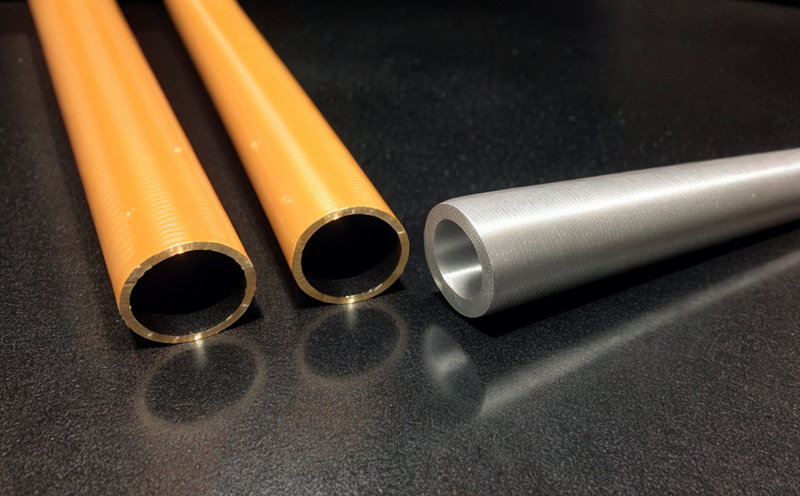ASTM D6483 Compression Testing of Polymer Matrix Laminates
The American Society for Testing and Materials (ASTM) D6483 standard specifies the procedure for determining the compressive properties of polymer matrix laminates. This test method is critical in aerospace and aviation, where materials must withstand severe mechanical stresses without compromising structural integrity. Polymer matrix composites are widely used due to their high strength-to-weight ratio, corrosion resistance, and ability to absorb energy during impact.
The testing process involves subjecting a carefully prepared laminate specimen under controlled conditions to compressive forces until failure occurs. The standard ensures that the test parameters and reporting methods are consistent across different laboratories, facilitating reliable comparisons of material performance.
Materials commonly tested using ASTM D6483 include:
- Polyetherimide (PEI)
- Polyetheretherketone (PEEK)
- Glass fiber-reinforced thermoplastics
- Bismaleimide (BMI) resins
Understanding the compression behavior of these materials is crucial for aerospace and aviation applications, including aircraft structures, engine components, and landing gear. The results from ASTM D6483 help ensure that materials meet stringent safety requirements set by regulatory bodies such as the Federal Aviation Administration (FAA) and European Union Aviation Safety Agency (EASA).
The testing procedure typically involves:
- Preparing specimens according to ASTM D6483 specifications
- Mounting the specimen in a compression testing machine
- Applying compressive forces until failure
- Recording stress-strain data and other relevant parameters
The results provide valuable insights into:
- Ultimate tensile strength
- Yield strength
- Elastic modulus of elasticity (Young's modulus)
- Strain at yield and fracture
The data obtained from ASTM D6483 are essential for optimizing material selection, improving product design, and ensuring compliance with industry standards.
| Material | Ultimate Tensile Strength (MPa) | Young's Modulus (GPa) | Strain at Yield (%) |
|---|---|---|---|
| Polyetherimide (PEI) | 345 MPa | 2.7 GPa | 1.8% |
| Bismaleimide (BMI) Resin | 60 MPa | 3.5 GPa | 2.2% |
The test parameters must be closely followed to ensure accurate results. Factors such as specimen preparation, environmental conditions, and testing machine calibration can significantly impact the outcome.
In conclusion, ASTM D6483 is a vital tool for aerospace and aviation industries, providing critical data on the compressive properties of polymer matrix laminates. This information helps manufacturers and engineers make informed decisions about material selection and design optimization.
Scope and Methodology
The scope of ASTM D6483 covers the determination of the compressive properties of polymer matrix laminates using a compression testing machine. The methodology specifies the preparation, mounting, and testing procedures to ensure consistent results across different laboratories.
The test involves:
- Preparation of specimens in accordance with ASTM D6483
- Mounting the specimen in a compression testing machine
- Application of compressive forces until failure occurs
- Data recording and analysis
The methodology emphasizes the importance of:
- Specimen preparation
- Environmental control during testing
- Calibration of testing equipment
The test results provide valuable information on the compressive properties of polymer matrix laminates, including ultimate tensile strength, yield strength, and elastic modulus. These data are essential for optimizing material selection and ensuring compliance with industry standards.
In aerospace and aviation applications, accurate compressive property data ensure that materials can withstand severe mechanical stresses without compromising structural integrity. The methodology outlined in ASTM D6483 ensures consistent results across different laboratories, facilitating reliable comparisons of material performance.
Industry Applications
The ASTM D6483 Compression Testing of Polymer Matrix Laminates is widely used in the aerospace and aviation industries to ensure that materials meet stringent safety requirements. The testing procedure provides critical data on the compressive properties of polymer matrix laminates, which are essential for optimizing material selection and ensuring compliance with industry standards.
| Application | Material | Compressive Properties Measured |
|---|---|---|
| Aircraft Structures | Polyetherimide (PEI) | Ultimate tensile strength, yield strength, elastic modulus of elasticity (Young's Modulus) |
| Engine Components | Bismaleimide (BMI) Resin | Strain at yield and fracture |
The test results are essential for optimizing material selection and ensuring compliance with industry standards. The methodology outlined in ASTM D6483 ensures consistent results across different laboratories, facilitating reliable comparisons of material performance.
In aerospace and aviation applications, accurate compressive property data ensure that materials can withstand severe mechanical stresses without compromising structural integrity. The testing procedure provides critical insights into the behavior of polymer matrix laminates under compression, helping manufacturers and engineers make informed decisions about material selection and design optimization.
Competitive Advantage and Market Impact
- Precision in Material Selection: ASTM D6483 ensures that materials are selected based on accurate compressive property data.
- Consistent Results Across Laboratories: The standard methodology guarantees consistent results, enhancing reliability across the industry.
- Informed Design Decisions: Test data help manufacturers and engineers make informed decisions about material selection and design optimization.
- Enhanced Safety Standards: Accurate compressive property data ensure that materials meet stringent safety requirements set by regulatory bodies such as the FAA and EASA.
The use of ASTM D6483 provides a competitive advantage in the aerospace and aviation industries. By ensuring consistent results, manufacturers can enhance product performance and reliability. The standard methodology also helps to maintain compliance with industry standards, thereby reducing the risk of non-compliance issues.
Furthermore, accurate compressive property data help manufacturers stay ahead of competitors by optimizing material selection and design optimization. This ensures that products meet stringent safety requirements set by regulatory bodies, enhancing overall product performance and reliability.





